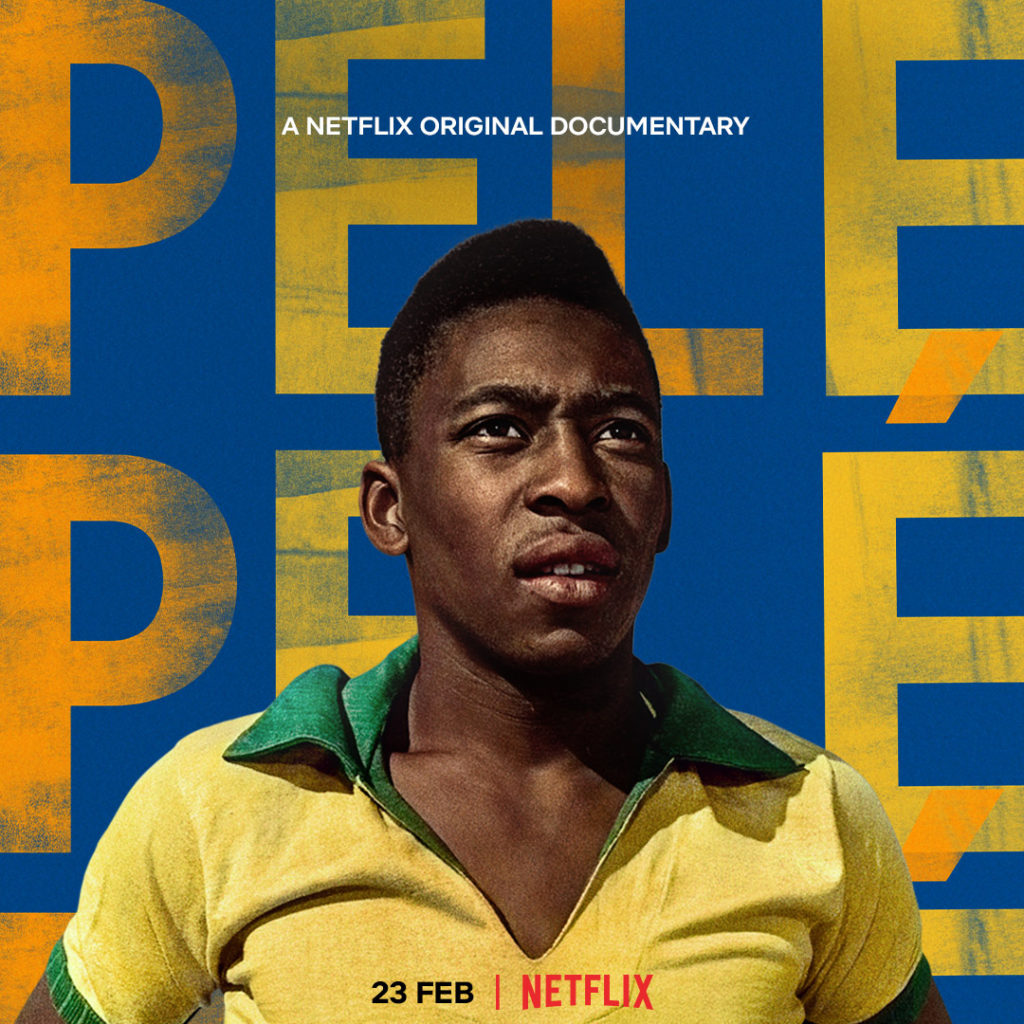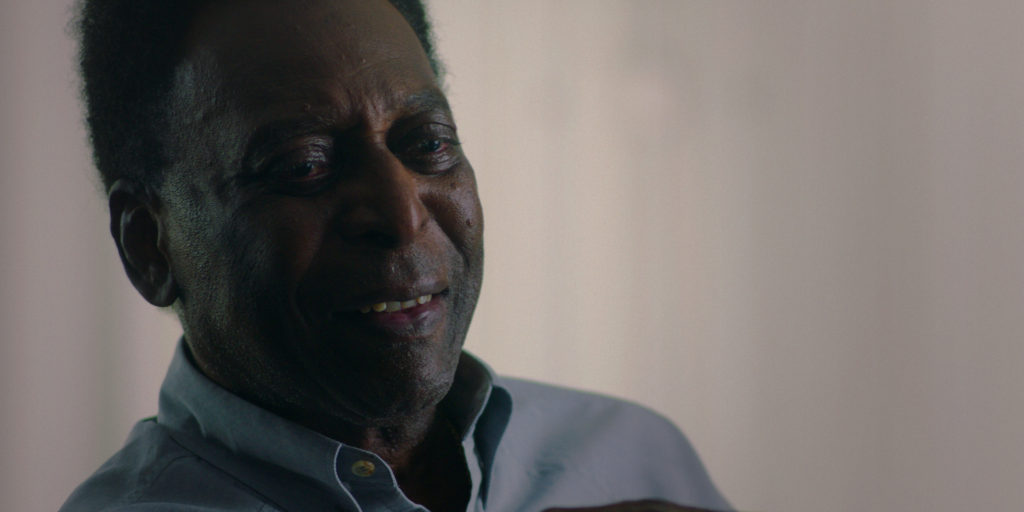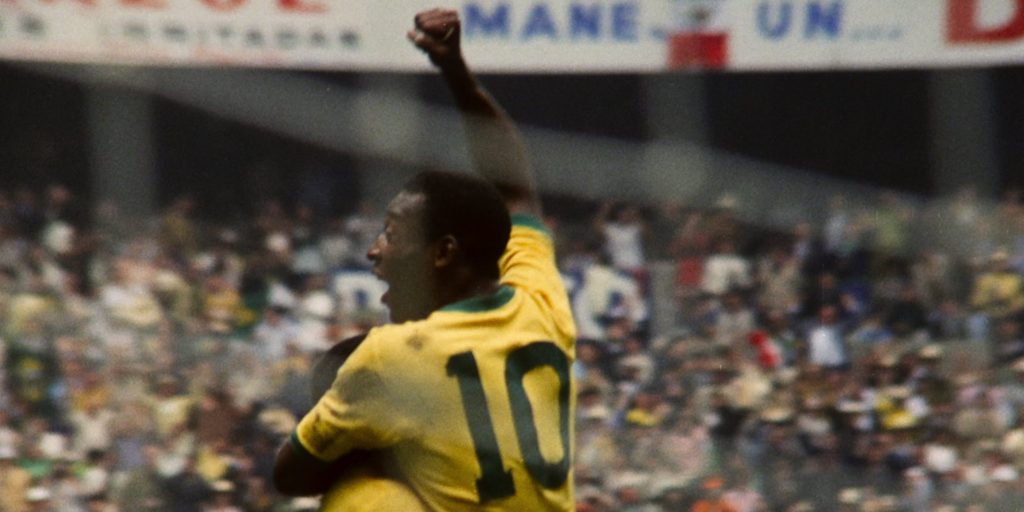SG Reviews: Pelé

It is not so farfetched to say that, within the younger generations, Pelé is in need of an image change.
If one searches “Pelé” into twitter, they are just as likely to come across jokes and sneers at his potentially dubious goalscoring record, as they are compilations of his wizardry on the pitch.
Indeed, as the years since his retirement stretch on and more contenders to the title of the ‘greatest’ emerge, the mind-boggling achievements by the Brazilian are in real danger of being, not forgotten, but certainly side-lined in the subconscious of football fans.
But thanks to Pelé (streaming on Netflix February 23) the reset button has been hit.
A Great man in an empty office
Directed by Ben Nicholas and David Tryhorn, Pelé does what is says on the tin. The film takes the viewer on a journey from Pelé’s humble beginnings working as a shoeshine boy, to his journey into global stardom.
Throughout the 1 hour 48-minute run time viewers are treated to a broad selection of talking heads, ranging from Pelé’s sister and uncle, to fellow players to even politicians who held office during the dark days of the nation’s military dictatorship.
But it is the voice of the man himself that draws you in. Emerging into a deserted office space with assistance from a Zimmer frame, the now 80-year-old Pelé is clearly as sharp as ever, as he allows himself to fall back into the memories of a career like no other.
Speaking openly on all subjects put to him, including details of his personal life off the pitch, you are quick to connect with a man who still clearly cannot quite believe the life he has had.
Indeed, it is in these moments of reflection that the emotional core of the film can be found, with Pelé himself frequently brought to tears when reminiscing, especially looking back on his international playing career and the pressure he felt.
“The greatest gift from victory isn’t the trophy, it’s the relief,” Pelé states, his voice heavy with emotion.
Yet despite this, his involvement remains rather static. A reunion with his old Santos teammates is one the only times the Brazilian is not talking to camera in that same sparse office block, or watching, watery-eyed, clips of his 17-year-old self bamboozling the blurred outlines of conquered defenders.
This footage, it should also be said, is another great asset of Pelé. Remarkable early material of the young genius employing that trademark goal, taking one or sometimes even three touches, juggling the ball around defences before volleying it into the bottom corner, never gets old. Plaudits must certainly go to the team who managed to source such gems.

When are we again?
However, whilst Pelé himself does much to elevate the film to the high standard of previous Netflix sporting documentaries, the core structure of Pelé is where it starts to fall down.
Starting with the opening of the 1970 World Cup in Mexico, Pelé’s last tournament, you are plunged right into the action, before being whisked immediately back to the sportsman’s childhood.
But from then on, the narrative becomes quite erratic, as you hurtle through Pelé’s youth, the 1958 World Cup and the 1962 World Cup without time to stop for a breath. Perhaps it’s a consequence of the lack of available footage, but this structure leaves the film feeling somewhat disjointed.
Indeed, as soon as the film finished with the 1966 World Cup, I was rather surprised to discover that, despite having only one major tournament to go, there was still over an hour left.
The politics of football
Whilst football takes something of a back seat in the second act, its place is filled by a deep dive into the political history of Brazil in the 60’s and 70’s, specifically the events in the country following the 1964 military coup.
A great deal of time is dedicated to explaining to the audience the significance of these events, while at the same time interspersing them with clips of more stupendous Pelé goals.
One reason for such an abrupt change in focus is to explore in detail Pelé’s rather cosy relationship with the new military government.
Indeed, when asked his views on the regime, Pelé replies simply: “Football stayed the same.”
Some of the critics of Pelé’s links with the dictatorship are present in the film, and make clear their views on this subject. Fellow Brazilian international Paulo Cezar Lima went so far as to state: “I thought his behaviour was that of a Black man who says ‘yes sir’ who accepts everything and does not answer back, question or judge.
“It is a criticism I hold against him to this day. Because one statement from Pele would have gone a long way in Brazil.”
But for the most part, this narrative all feels somewhat forced, as though the directors were trying to show Pelé perhaps more flawed than he is.
Indeed, when one judges his personal life against that of the man he is endlessly compared to, Diego Maradona, it is simply chalk and cheese. Pelé simply lacks that plethora of scandals and personal flaws.
Whilst this is not a critique of the man himself, to make a character compelling to an audience they must have some kind of detriment.
Indeed, when more murkier aspects of his character are on display in an attempt to humanise him, such as discussions around his extra-marital affairs, they too feel out of place, with just one question posed to Pelé about them.

Worth watching?
For Nicholas and Tryhorn it is clear that with Pelé they wanted to show, in no uncertain terms, that the history of Pelé is the history of Brazil and, for the most part, they succeeded.
With a figure such as Pelé, a man who has been a global icon since the 1950’s, the question has to be asked of the documentary, what has this brought to the table?
In truth, if you are a Pelé aficionado seeking new knowledge about the Brazilian legend you may be left disappointed, but that is not really the point of the film.
Its purpose is not simply to educate, but to act as a timely reminder for the footballing community of how brilliant Pelé was on the pitch, in a time where so many faceless social media accounts would have you believe otherwise.
But more than that, the true point of Pelé is to show the world how one shoeshine boy can grow to define and shape a nation, simply through kicking a leather ball into a net.
Pelé is available to stream 23rd of February exclusively on Netflix